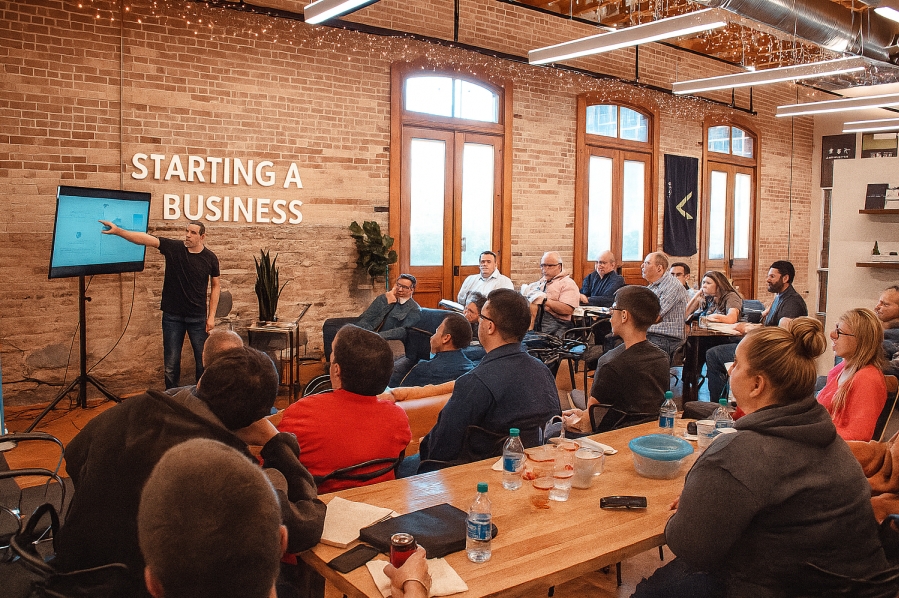Copyright TechStartups.com

Over the past seven years, we’ve covered hundreds of startups and founders who have raised millions in funding. Some succeeded spectacularly. Others faded quietly. While most of the spotlight often shines on experienced founders, this piece is for the new ones — the dreamers, first-time entrepreneurs, and anyone contemplating launching a business someday. Starting a business is one of the most exciting and intimidating decisions you’ll ever make. Yet too many founders jump in without asking the right questions first. The result? Great ideas collapse not because of a lack of passion, but because key fundamentals were overlooked. This guide breaks down 20 essential questions every aspiring founder should ask before leaping — questions that test your motivation, validate your market, and challenge your assumptions. They’ll help you think clearly before you commit so you can decide not just how to start a business, but whether you should start one right now. Top 20 Questions to Ask Yourself Before You Start a Business Section 1: Mindset & Motivation 1. Why do I really want to start a business — and is my motivation strong enough to sustain me through challenges? Every successful founder begins with a clear “why.” It’s easy to say you want freedom or financial independence, but when the excitement fades, only conviction keeps you going. Your motivation shapes every decision — from how you respond to failure to how you treat your customers. If your reason is shallow or reactionary, like escaping a bad job, the first setback will feel unbearable. Dig deeper. Ask yourself what truly drives you — is it solving a problem, creating value, or proving something to yourself? Founders with an authentic purpose tend to stay focused longer, pivot faster, and handle setbacks with clarity. Before chasing funding or building an MVP, make sure your “why” is something you can return to when everything else feels uncertain. 2. Am I mentally and emotionally prepared for uncertainty, long hours, and delayed rewards? Entrepreneurship looks glamorous from the outside, but it’s often unpredictable, lonely, and stressful. You’ll face long stretches without validation, unexpected financial pressure, and moments where nothing seems to work. That’s why mental readiness matters as much as market readiness. The best founders cultivate patience, resilience, and the ability to detach emotionally from outcomes they can’t control. Ask yourself how you respond to rejection, setbacks, or slow progress. Do you persist, or do you second-guess your decision to start? Being mentally prepared doesn’t mean avoiding fear — it means accepting uncertainty as part of the process. Founders who build emotional stamina early tend to make clearer decisions, recover faster from failure, and sustain their energy longer than those who rely only on motivation. 3. What does success mean to me — freedom, impact, financial independence, or something else? Success looks different for every entrepreneur. For some, it’s building a company that scales globally. For others, it’s creating a business that supports a flexible lifestyle. Defining what success means to you early prevents you from chasing someone else’s version of achievement. Without that clarity, it’s easy to get lost in vanity metrics like user counts or press coverage that don’t actually reflect your goals. Think about what you want your business to do for your life — not just what you want your life to do for your business. Maybe your goal is stability, creative freedom, or a legacy project that outlives you. There’s no wrong answer, but having a personal definition of success will guide your strategy and help you recognize real progress when it happens. 4. How will I protect my personal well-being and maintain balance once the business demands grow? Startups can consume your identity if you’re not careful. The early grind often demands 12-hour days, emotional rollercoasters, and personal sacrifices that can leave founders burned out before the business even finds its footing. Protecting your health isn’t weakness — it’s risk management. A clear mind and steady energy level are competitive advantages in a world where most founders crash from exhaustion. Set boundaries early. Schedule downtime the same way you’d schedule investor meetings. Surround yourself with people who remind you there’s life outside your startup. The founders who last aren’t always the most ambitious — they’re the ones who’ve learned to preserve energy for the long game. Section 2: Idea, Market & Validation 5. What specific problem am I solving, and is it a real pain point for my target customers? Every lasting startup begins with a problem worth solving. But many founders fall in love with ideas before confirming whether anyone actually needs them. The question isn’t whether your idea is clever — it’s whether the problem is painful enough for people to pay for a solution. A good test is whether potential customers are already hacking together their own fixes. When people improvise or complain about inefficiency, that’s a strong signal you’ve found something real. Start by listening more than pitching. Conduct interviews, observe user behavior, and identify patterns of frustration that your product could eliminate. If you can locate a recurring pain that affects a defined group of people, you’re not guessing anymore — you’re solving. Founders who anchor their vision in real human problems build relevance faster and waste less time chasing features no one cares about. 6. Who exactly is my target audience or ideal customer, and how well do I understand their needs? Clarity beats reach. Knowing your target customers or audience means narrowing your focus to the specific group whose problems you understand best. It’s tempting to say “everyone” could use your product, but “everyone” rarely buys anything. Start with a clear profile — demographics, behaviors, pain points, and motivations. What drives their decisions? Where do they hang out online? How do they talk about their frustrations? The sharper your audience definition, the better your messaging, pricing, and positioning. Founders who obsess over their first 100 true users — not theoretical millions — end up growing faster. Understanding your audience deeply turns marketing from guesswork into conversation. It’s not about who might buy; it’s about who must buy. 7. What makes my product or service truly unique — what’s my clear value proposition or differentiation? Your differentiation is the reason someone switches to you or stays loyal once they do. Without a clear answer to “why you?”, your business becomes a commodity competing on price. A strong value proposition tells customers what you do, who you do it for, and why you’re the obvious choice. It doesn’t have to be revolutionary — it just has to be specific. Maybe it’s faster delivery, a friendlier experience, or a niche focus others ignore. Study your competitors, but don’t obsess over them. Look for gaps they overlook or friction they create that you can simplify. Then express your differentiation in one short sentence that a customer could repeat. If your edge isn’t clear to them, it doesn’t exist. Over time, keep refining it; the market changes, and so should your unique value. 8. Who are my competitors, and how can I position my business to outperform or stand apart from them? Ignoring competitors doesn’t make them disappear. Every business has competition — even if it’s the customer choosing to do nothing. Studying your competitors helps you understand what’s already working, where customers feel underserved, and how the market defines value. It also prevents you from reinventing the wheel. Learn from their strengths and exploit their blind spots. The goal isn’t to copy; it’s to position yourself clearly. Maybe your brand is more personal, your pricing more transparent, or your product simpler to use. When you know where you fit in the landscape, you can shape your story and strategy with precision. Great founders don’t fear competition — they use it as a mirror to sharpen their edge. Section 3: Market Size, MVP Validation, Marketing, and Pricing 9. Is there a large enough market to support my revenue goals, and how can I validate demand before launching? A brilliant idea means little if the market is too small to sustain it. Before investing months of time and savings, confirm that enough people need — and will pay for — what you’re offering. Many founders skip this step and assume enthusiasm equals scale. But enthusiasm without buying intent is noise. Estimate your total addressable market (TAM) and serviceable available market (SAM). Even a niche can work if it’s big enough or growing fast. Validation comes from evidence, not intuition. Build a landing page to gauge sign-ups, run small ad tests, or collect early preorders. Real signals — like people paying, sharing, or returning — matter more than survey optimism. If you can show traction at a small scale, you’re not just launching with confidence; you’re proving your market before it’s even official. 10. Have I tested my idea or prototype (MVP) with real users to confirm there’s genuine interest and willingness to pay? Testing separates ideas that sound good from those that work. A minimum viable product (MVP) isn’t about building something perfect — it’s about learning fast and cheap. Many founders spend months coding when they could test the same assumptions with a simple prototype or even a manual process. The goal is feedback, not perfection. Let real users interact with what you’ve built. Watch where they hesitate, what they skip, and what excites them. Ask if they’d pay for it today — not “someday.” The earlier you expose your idea to the market, the sooner you can refine it into something people actually want. The best founders treat validation as a loop, not a single step: build, test, learn, repeat. 11. How will I attract and retain customers — what’s my marketing and promotion plan? No matter how great your product is, it can’t sell itself if no one knows it exists. Marketing isn’t about shouting louder — it’s about connecting with the right people in the right place at the right time. Start with your audience’s habits: where they spend time online, what they read, and whom they trust. From there, pick one or two channels you can execute well — social media, SEO, newsletters, or partnerships — and focus deeply before expanding. Retention is just as important as acquisition. The easiest sale you’ll ever make is to someone who already trusts you. Build a system to engage users post-purchase — through updates, rewards, or community. Marketing is an ongoing relationship, not a one-time campaign. Founders who understand how that builds momentum that compounds over time. 12. How will I price my product or service to balance value, competitiveness, and profit? Pricing is both art and strategy. Set it too high, and you scare off early users; too low, and you signal cheapness or struggle to stay afloat. The right price reflects both perceived value and real cost. Study your competitors, but don’t blindly copy them. A slightly higher price justified by better experience or quality often attracts better customers and higher margins. Test your pricing openly. Offer tiers, trials, or bundles to learn what customers are willing to pay. Remember: pricing is communication — it tells people what kind of business you are. Founders who experiment early with price psychology often discover they were undervaluing themselves from the start. Section 4: Growth Channels, Financial Readiness, and Funding 13. What channels, partnerships, or strategies will help me reach my audience efficiently? Growth isn’t about being everywhere — it’s about finding what works and doubling down. Early on, most startups waste energy chasing too many marketing channels at once. The better approach is to identify where your ideal customers already spend time and meet them there. Maybe that’s niche newsletters, online communities, or strategic B2B partnerships. Start narrow, measure traction, and scale only what brings consistent returns. Partnerships can accelerate growth faster than ads ever will. Align with complementary businesses that already serve your target audience. A single co-marketing effort, bundled offer, or integration can bring more qualified leads than months of cold outreach. Growth compounds when your efforts build on existing trust rather than trying to create it from scratch. 14. How much money do I need to get started — and do I have enough runway to operate for 12–18 months? Underestimating startup costs is one of the most common early mistakes. It’s easy to focus on product expenses and forget about licenses, tools, taxes, and marketing. A clear budget should cover not only setup costs but also your personal living expenses. The safest assumption is to add 20–30% more than your initial projections. That buffer gives you room to survive inevitable surprises. Runway is your oxygen. Whether it’s savings, early revenue, or seed funding, you need enough to operate for at least a year without panicking. When you’re always worried about running out of cash, you make desperate decisions that hurt the business. A founder who plans conservatively can move calmly, and calm execution usually beats frantic improvisation. 15. Will I need loans, investors, or external financing — and do I fully understand the obligations? Funding can accelerate growth, but it always comes with trade-offs. Before taking on loans or investors, understand what you’re giving up — control, equity, or future profit. Debt can be dangerous if your revenue isn’t stable; investor capital can dilute your ownership faster than you expect. The right financing decision depends on your business model, not your ego. Map out your financing options clearly. If you borrow, know the repayment terms and impact on cash flow. If you raise equity, know how much ownership you’re parting with and whether your investors align with your vision. Smart founders don’t chase capital — they choose it strategically, only when it amplifies what already works. 16. How long will it realistically take before my business becomes profitable, and what’s my backup plan if it takes longer? Profit rarely arrives on schedule. Most businesses take one to three years to break even, but few founders prepare for that reality. Profitability isn’t just about revenue — it’s about managing costs, reinvesting wisely, and staying patient. Expecting instant success sets you up for frustration and poor decisions. Build your plan around realistic milestones, not wishful thinking. Track burn rate, watch early indicators like repeat purchases or retention, and be ready to pivot if numbers stay flat. Having a contingency plan — such as freelance work, part-time help, or temporary expense cuts — isn’t a sign of weakness; it’s responsible survival. Founders who plan for longevity give their startups the time they need to become truly sustainable. Section 5: Operations, Legal & Structure 17. What legal structure best suits my business (LLC, S-Corp, etc.), and have I met all compliance requirements? The legal structure you choose affects everything — taxes, liability, funding, and even how investors perceive your business. Many founders rush into formation without considering long-term implications. A sole proprietorship might be fine for a freelancer, but a scalable company often needs the liability protection of an LLC or corporation. The right choice depends on how you plan to operate, who’s involved, and how profits will be distributed. Don’t guess on this step. A short consultation with a business attorney or accountant can prevent years of costly restructuring. Once formed, stay compliant — file annual reports, pay fees, and keep finances separate from personal accounts. Proper structure gives you credibility and peace of mind, allowing you to focus on building instead of worrying about legal surprises. 18. What taxes, permits, and regulations must I follow at the local, state, and federal levels? Compliance may not be exciting, but it’s non-negotiable. Every location and industry has its own tax rules, licenses, and reporting requirements. Skipping even a minor permit can lead to fines or forced closures. Before you launch, make a checklist of what applies to your business — from sales tax registration to data-privacy laws. Consider this part of your startup foundation, not red tape. Staying compliant signals professionalism to banks, partners, and customers. It also saves you from distraction later when growth accelerates. The goal isn’t to become an expert in tax law — it’s to build a business sturdy enough to pass any audit without panic. 19. What kind of insurance coverage do I need to protect my business, assets, and employees? Insurance isn’t just for large corporations — it’s protection for your survival. A single accident, data breach, or lawsuit can erase months of progress. Depending on your field, you might need general liability, property, professional, or cyber insurance. The cost is often modest compared to the risk of being uninsured. Think of coverage as a safety net that lets you take calculated risks. Review policies annually as your business grows, adding protection for new assets or employees. Founders who treat insurance as part of risk management — not an afterthought — sleep better and recover faster when the unexpected happens. 20. What people, suppliers, and resources are essential to get started — and how will I manage them efficiently? No founder succeeds alone. The quality of your partners, vendors, and early hires often determines how smoothly you can execute. Identify which roles are critical — accounting, marketing, operations — and decide what to outsource versus handle in-house. A reliable supplier or skilled freelancer can save you more time and money than the cheapest option ever could. Once your team and suppliers are in place, set clear expectations and systems early. Use contracts, define deliverables, and communicate frequently. Chaos at the operational level drains focus from strategy. Founders who build structure around people and processes from day one create businesses that scale gracefully instead of collapsing under their own growth. Conclusion: The Questions That Shape the Journey Starting a business is rarely a straight path. It’s a mix of vision, uncertainty, and relentless learning. The founders who endure aren’t necessarily the smartest or the most connected — they’re the ones who pause to ask the right questions before leaping. Each question in this list exists for a reason: to help you think critically before committing time, capital, and energy to something that will demand everything from you. Don’t rush through these questions. Sit with your answers, refine them, and revisit them often. The process of questioning isn’t a one-time checklist — it’s a mindset. Every stage of your business will present new versions of these same questions, from funding and hiring to scaling and succession. At TechStartups, we’ve seen hundreds of founders turn uncertainty into opportunity by staying grounded in self-awareness and purpose. If you can answer these 20 essential questions honestly, you’re already ahead of most. You’re not just starting a business — you’re building the foundation for something that can last.



